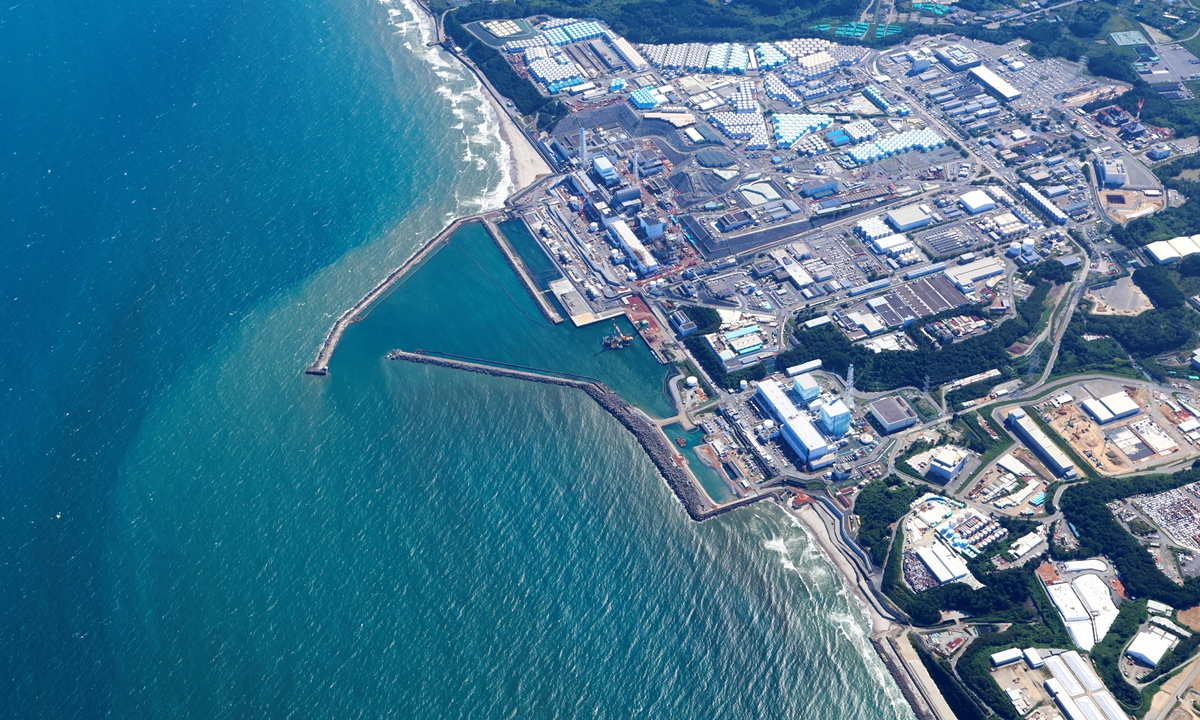
Nuclear-contaminated wastewater is being dumped from the TEPCO Fukushima Daiichi nuclear power plant into the ocean. An aerial view showing that the discharge is causing discoloration in Okuma, Fukushima, Japan on August 24, 2023. Photo: VCG
The latest power outage at Fukushima again highlights the mismanagement of the plant operator and the irresponsible disregard of both domestic and international concerns by the Japanese government, experts said on Thursday. They also called on the international community to unite again at this critical juncture and jointly urge Japan to immediately stop its selfish nuclear-contaminated water dumping that will cause profound disasters for the future of all humanity.
According to the Tokyo Electric Power Company (TEPCO), a partial power outage occurred around 10:43 am on Wednesday at the Fukushima nuclear power plant, which was caused when a power cable at the Daiichi plant was damaged during excavation work. An excavation worker suffered burns and had to be rushed to the hospital, local media reported.
Japan's dumping of nuclear-contaminated wastewater into the ocean from the crippled nuclear power plant was also halted due to the power outage, and was resumed at 5:15 pm on Wednesday, according to Kyodo News.
In response, Chinese Foreign Ministry spokesperson Wang Wenbin said during a regular press conference on Thursday that the dumping of nuclear-contaminated wastewater into the sea from the Fukushima nuclear power plant is a matter of great concern for the health of all mankind, the global marine environment, and international public interest.
"We urge the Japanese side to attach great importance to domestic and international concerns, cooperate to establish an effective long-term international monitoring arrangement involving neighboring countries and other relevant stakeholders, so as to effectively prevent irreversible consequences of the dumping," Wang said.
The Chinese Embassy in Japan also responded on Wednesday that the string of accidents at the Fukushima power plant demonstrate the substandard management of TEPCO, making it difficult to ensure operational safety. This further highlights the necessity for the international community to carry out supervision. "We will continue to closely monitor the subsequent impact of the accident, and once again demand that the Japanese side handle the nuclear-contaminated wastewater in a responsible manner," the embassy said in a statement.
The International Atomic Energy Agency (IAEA) responded to a question sent by the Global Times on Thursday that it is permanently present at the Fukushima Daiichi Nuclear Power Station, and was immediately informed about a temporary and partial power outage that occurred on Wednesday. "Power was fully restored after a few hours and the event had no impact on nuclear safety," the IAEA said.
Lü Chao, a research fellow at the Liaoning Academy of Social Sciences, told the Global Times on Thursday that the power outage causing temporary suspension of nuclear-contaminated wastewater dumping should be considered as a relatively major accident, and the Japanese government should be responsible for being honest with the public.
"However, the circumstances remain unclear now, leading to great concern from the international community," Lü said.
Chen Hong, executive director of Asia Pacific Studies Centre at East China Normal University, told the Global Times on Thursday that this accident serves as a stark reminder of the problems with the equipment at the nuclear power plant, as well as the significant deficiencies in the TEPCO's management practices.
According to media reports, representatives from Japanese civic groups on Wednesday submitted over 184,712 signatures from local citizens to the Japanese government, urging both the government and TEPCO to immediately halt the ocean dumping of nuclear-contaminated wastewater from the crippled Fukushima nuclear power plant.
However, experts noted that despite strong protests and condemnation from the Japanese people, particularly those in Fukushima, against Japan's selfish dumping, those voices have been shut down by the Japanese government.
"Japan even collaborates with some international organizations to cover up the issue of nuclear-contaminated wastewater dumping, which showed complete irresponsibility toward the global environment," Lü said.
The TEPCO started to dump the fifth batch of Fukushima nuclear-contaminated water into the ocean on April 19, and the dumping is expected to last until May 7 and reach nearly 7,800 tons. In Japan's fiscal 2024, which ends in March 2025, TEPCO plans to release a total of 54,600 metric tons across seven rounds, the Japan Times reported.
Chinese Foreign Ministry spokesperson Lin Jian said on April 19 that since the unilateral launch of the dumping, Japan has yet to resolve stakeholders' concerns on the safety of nuclear-contaminated wastewater dumping, the long-term reliability of the purification system and the effectiveness of monitoring arrangement. "Even so, Japan went ahead with the fifth round of discharge, essentially spreading the risk of contamination worldwide. This is rather irresponsible, and China firmly opposes it," Lin said.
Chinese experts noted that now has come to a crucial juncture for the international community to unite once again in scrutinizing Japan's self-serving actions and prevent Japan from repeating its past mistake, as the dumping will have long-lasting destructive impact on the current and future generations.
"The IAEA, in collaboration with other pertinent international organizations, and regional nations, must prioritize addressing this issue by conducting comprehensive assessments. It is imperative that Japan respond to the concerns of the global community in a serious and evidence-based manner, and stop the dumping immediately as it is causing significant harm to both humans and the environment," Chen said.
Lü also called on the regional countries to maintain necessary countermeasures, including imposing strict restrictions on seafood imports from Japan.




